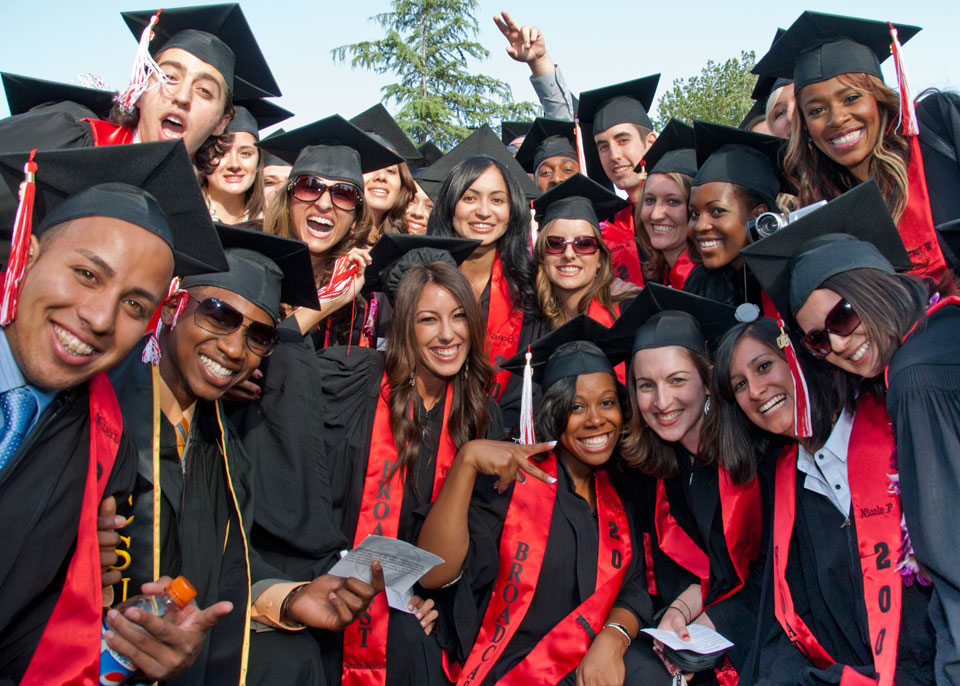CSUN Honored as a National Role Model of Diversity

Celebratory students at a past California State University, Northridge commencement ceremony. Photo by Lee Choo.
California State University, Northridge has been recognized for its commitment to diversity by Minority Access, an organization advocating diversity in higher education, employment and research. CSUN was honored at the 16th National Role Models Conference in Baltimore, Md., Sept. 24.
Susan Hua, CSUN’s Director of Equity and Diversity, said she is excited by the honor.
“I really do find that our university has a diversity ethos that permeates the campus,” she said. “The award is a testament to individuals from all corners of this campus who have been engaged in diversity and inclusion work for many years.”
According to College Portraits, CSUN’s ethnic population constitutes a majority of the 40,000-plus student population. Latino students comprise 40 percent of undergraduate students. Women make up about 55 percent of undergraduate students. Approximately 30 percent are first-generation college students and half of CSUN undergraduate students are from low-income families. CSUN also enrolls the largest number of international students attending a public comprehensive university.
Hua said that CSUN’s commitment to diversity goes beyond categories and demographics. Rather, the focus is on inclusivity and a celebration of students’ identities.
“Diversity is not just about what has become the more salient categories such as race and gender; it’s so much more than that,” Hua said. “We are complex beings. A person is an intersection of many different traits and we need to create an environment where people not only feel comfortable, but celebrated. It is about being mindful and culturally proficient and that takes intentional work.”
CSUN offers one of the largest and most diverse selections of ethnic studies within the CSU, with historical significance. The university founded the first Central American studies program in the nation 15 years ago, and became it its own academic department in August. The long-standing Chicana/o studies department is one of the first of its kind in the country. CSUN also offers other major and minor options in programs like Africana, Asian American, American Indian, Jewish, Middle Eastern and Islamic, and queer studies.
Hua said while there is a trend in higher education to eliminate ethnic studies and liberal studies in general, CSUN’s programs remain a critical level of study.
“What’s interesting and hopeful to me is that these are programs and areas of concentrations of study that students want and demand,” Hua said. “If the classes weren’t filling up, perhaps I could see them becoming obsolete, but they are not — they remain in demand and are important to our students.”
CSUN also has a number of diversity initiatives supporting students’ academic careers, including the Educational Opportunity Program (EOP), which improves access and retention services to low-income, educationally disadvantaged, first-generation college students. Many target science, technology, engineering and mathematics (STEM) studies, including the Accelerated Coursework in Computer Science and Engineering for Student Success (ACCESS); the NIH-funded Maximizing Access to Research Careers (MARC); and the Attract, Inspire, Mentor and Support students (AIMS2) initiative.
The campus serves various groups through resource centers such as the Pride Center, supporting the LGBTQ community; the Veterans Resource Center, assisting students to transition from military service to academic success; the National Center on Deafness, a nationally known leader in educational support for deaf and hard of hearing students; and the Disability Resources and Educational Services office, providing accommodations for students with disabilities.
To manage all of these initiatives and “lend collective strength to our university diversity programming,” CSUN has created a new position called the Chief Diversity Officer (CDO), Hua said. The CDO is expected to lead a newly established Commission on Diversity and Inclusion Initiatives, which is charged with conducting a review of current diversity efforts and will make recommendations for addressing areas of strengths and gaps.
CSUN Associated Students President Jorge Reyes said diversity is very important to students.
“Our ability to relate to so many different students is something we are very proud to have here at CSUN,” Reyes said. “When people talk about diversity, they think of the word ‘tolerant’, but a better word is acceptance — we are accepting of all different cultures.”
Reyes said he has personally benefitted from the diversity at CSUN, where he can interact with many different communities, including deaf and international students. He said CSUN students are better prepared for the professional workforce because of the campus’ inclusive culture.
“Understanding other people’s cultures and backgrounds is a great advantage,” Reyes said. “I know how to be accepting of students instead of being scared to approach others they don’t know.

 experience
experience